中华人民共和国工会法(2001修正)
21、中华人民共和国工会法

中华人民共和国工会法1992年4月3日第七届全国人民代表大会第五次会议通过根据2001年10月27日第九届全国人民代表大会常务委员会第二十四次会议《关于修改<中华人民共和国工会法>的决定》修正第一章总则第二条工会是职工自愿结合的工人阶级的群众组织。
中华全国总工会及其各工会组织代表职工的利益,依法维护职工的合法权益。
第三章工会的权利和义务第二十二条企业、事业单位违反劳动法律、法规规定,有下列侵犯职工劳动权益情形,工会应当代表职工与企业、事业单位交涉,要求企业、事业单位采取措施予以改正;企业、事业单位应当予以研究处理,并向工会作出答复;企业、事业单位拒不改正的,工会可以请求当地人民政府依法作出处理:(一)克扣职工工资的;(二)不提供劳动安全卫生条件的;(三)随意延长劳动时间的;(四)侵犯女职工和未成年工特殊权益的;(五)其他严重侵犯职工劳动权益的。
第二十三条工会依照国家规定对新建、扩建企业和技术改造工程中的劳动条件和安全卫生设施与主体工程同时设计、同时施工、同时投产使用进行监督。
对工会提出的意见,企业或者主管部门应当认真处理,并将处理结果书面通知工会。
第二十四条工会发现企业违章指挥、强令工人冒险作业,或者在生产过程中发现明显重大事故隐患和职业危害,有权提出解决的建议,企业应当及时研究答复;发现危及职工生命安全的情况时,工会有权向企业建议组织职工撤离危险现场,企业必须及时作出处理决定。
第二十六条职工因伤亡事故和其他严重危害职工健康问题的调查处理,必须有工会参加。
工会应当向有关部门提出处理意见,并有权要求追究直接负责的主管人员和有关责任人员的责任。
对工会提出的意见,应当及时研究,给予答复,第二十九条县级以上各级总工会可以为所属工会和职工提供法律服务。
第三十一条工会会同企业、事业单位教育职工以国家主人翁态度对待劳动,爱护国家和企业的财产,组织职工开展群众性的合理化建议、技术革新活动,进行业余文化技术学习和职工培训,组织职工开展文娱、体育活动。
中华人民共和国工会法

中华人民共和国工会法目录中华人民共和国工会法第一章总则第二章工会组织第三章工会的权利和义务第四章基层工会组织第五章工会的经费和财产第六章附则中华人民共和国工会法(修正)第三次大修订中华人民共和国工会法主席令(1992年4月3日第七届全国人民代表大会第五次会议通过,主席令第五十七号公布自公布之日起施行)目录第一章总则第二章工会组织第三章工会的权利和义务第四章基层工会组织第五章工会的经费和财产第六章附则第一章总则第一条为保障工会在国家政治、经济和社会生活中的地位,确定工会的权利与义务,发挥工会在社会主义现代化建设事业中的作用,根据宪法,制定本法。
第二条工会是职工自愿结合的工人阶级的群众组织。
第三条在中国境内的企业、事业单位、机关中以工资收入为主要生活来源的体力劳动者和脑力劳动者,不分民族、种族、性别、职业、宗教信仰、教育程度,都有依法参加和组织工会的权利。
第四条工会必须遵守和维护宪法,以宪法为根本的活动准则,依照工会章程独立自主地开展工作。
工会会员全国代表大会制定或者修改《中国工会章程》,章程不得与宪法和法律相抵触。
国家保护工会的合法权益不受侵犯。
第五条工会组织和教育职工依照宪法和法律的规定行使民主权利,发挥国家主人翁的作用,通过各种途径和形式,参与管理国家事务,管理经济和文化事业,管理社会事务;协助人民政府开展工作,维护工人阶级领导的、以工农联盟为基础的人民民主专政的社会主义国家政权。
第六条工会在维护全国人民总体利益的同时,维护职工的合法权益。
工会必须密切联系职工,听取和反映职工的意见和要求,关心职工的生活,帮助职工解决困难,全心全意为职工服务。
第七条全民所有制和集体所有制企业事业单位的工会,组织职工依照法律规定参加本单位的民主管理和民主监督。
第八条工会动员和教育职工以主人翁态度对待劳动,爱护国家和企业的财产,遵守劳动纪律,发动和组织职工努力完成生产任务和工作任务。
工会组织职工开展社会主义劳动竞赛,开展群众性的合理化建议、技术革新和技术协作的活动,提高劳动生产率和经济效益,发展社会生产力。
中华人民共和国工会法
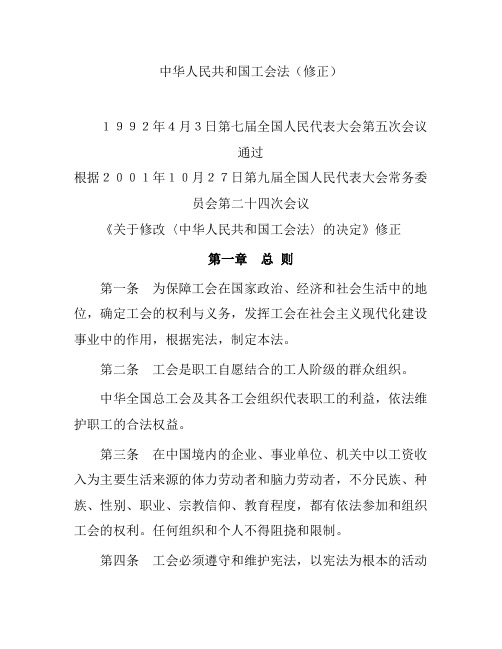
中华人民共和国工会法(修正)1992年4月3日第七届全国人民代表大会第五次会议通过根据2001年10月27日第九届全国人民代表大会常务委员会第二十四次会议《关于修改〈中华人民共和国工会法〉的决定》修正第一章总则第一条为保障工会在国家政治、经济和社会生活中的地位,确定工会的权利与义务,发挥工会在社会主义现代化建设事业中的作用,根据宪法,制定本法。
第二条工会是职工自愿结合的工人阶级的群众组织。
中华全国总工会及其各工会组织代表职工的利益,依法维护职工的合法权益。
第三条在中国境内的企业、事业单位、机关中以工资收入为主要生活来源的体力劳动者和脑力劳动者,不分民族、种族、性别、职业、宗教信仰、教育程度,都有依法参加和组织工会的权利。
任何组织和个人不得阻挠和限制。
第四条工会必须遵守和维护宪法,以宪法为根本的活动准则,以经济建设为中心,坚持社会主义道路、坚持人民民主专政、坚持中国共产党的领导、坚持马克思列宁主义毛泽东思想邓小平理论,坚持改革开放,依照工会章程独立自主地开展工作。
工会会员全国代表大会制定或者修改《中国工会章程》,章程不得与宪法和法律相抵触。
国家保护工会的合法权益不受侵犯。
第五条工会组织和教育职工依照宪法和法律的规定行使民主权利,发挥国家主人翁的作用,通过各种途径和形式,参与管理国家事务、管理经济和文化事业、管理社会事务;协助人民政府开展工作,维护工人阶级领导的、以工农联盟为基础的人民民主专政的社会主义国家政权。
第六条维护职工合法权益是工会的基本职责。
工会在维护全国人民总体利益的同时,代表和维护职工的合法权益。
工会通过平等协商和集体合同制度,协调劳动关系,维护企业职工劳动权益。
工会依照法律规定通过职工代表大会或者其他形式,组织职工参与本单位的民主决策、民主管理和民主监督。
工会必须密切联系职工,听取和反映职工的意见和要求,关心职工的生活,帮助职工解决困难,全心全意为职工服务。
第七条工会动员和组织职工积极参加经济建设,努力完成生产任务和工作任务。
《关于修改〈中华人民共和国工会法〉的决定》修正
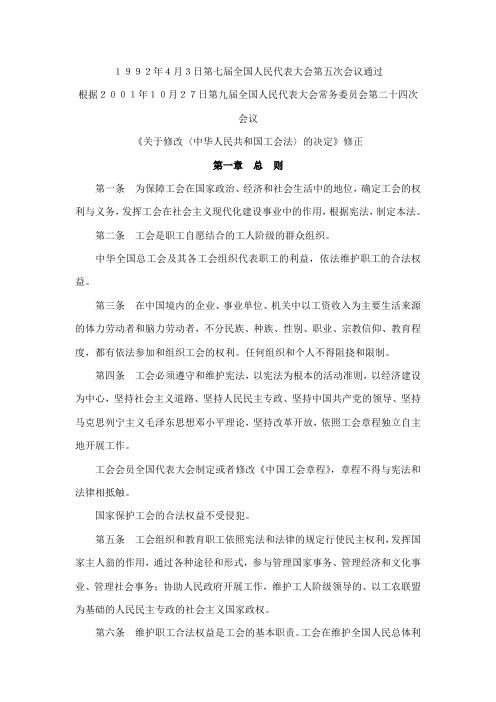
1992年4月3日第七届全国人民代表大会第五次会议通过根据2001年10月27日第九届全国人民代表大会常务委员会第二十四次会议《关于修改〈中华人民共和国工会法〉的决定》修正第一章总则第一条为保障工会在国家政治、经济和社会生活中的地位,确定工会的权利与义务,发挥工会在社会主义现代化建设事业中的作用,根据宪法,制定本法。
第二条工会是职工自愿结合的工人阶级的群众组织。
中华全国总工会及其各工会组织代表职工的利益,依法维护职工的合法权益。
第三条在中国境内的企业、事业单位、机关中以工资收入为主要生活来源的体力劳动者和脑力劳动者,不分民族、种族、性别、职业、宗教信仰、教育程度,都有依法参加和组织工会的权利。
任何组织和个人不得阻挠和限制。
第四条工会必须遵守和维护宪法,以宪法为根本的活动准则,以经济建设为中心,坚持社会主义道路、坚持人民民主专政、坚持中国共产党的领导、坚持马克思列宁主义毛泽东思想邓小平理论,坚持改革开放,依照工会章程独立自主地开展工作。
工会会员全国代表大会制定或者修改《中国工会章程》,章程不得与宪法和法律相抵触。
国家保护工会的合法权益不受侵犯。
第五条工会组织和教育职工依照宪法和法律的规定行使民主权利,发挥国家主人翁的作用,通过各种途径和形式,参与管理国家事务、管理经济和文化事业、管理社会事务;协助人民政府开展工作,维护工人阶级领导的、以工农联盟为基础的人民民主专政的社会主义国家政权。
第六条维护职工合法权益是工会的基本职责。
工会在维护全国人民总体利益的同时,代表和维护职工的合法权益。
工会通过平等协商和集体合同制度,协调劳动关系,维护企业职工劳动权益。
工会依照法律规定通过职工代表大会或者其他形式,组织职工参与本单位的民主决策、民主管理和民主监督。
工会必须密切联系职工,听取和反映职工的意见和要求,关心职工的生活,帮助职工解决困难,全心全意为职工服务。
第七条工会动员和组织职工积极参加经济建设,努力完成生产任务和工作任务。
中华人民共和国工会法
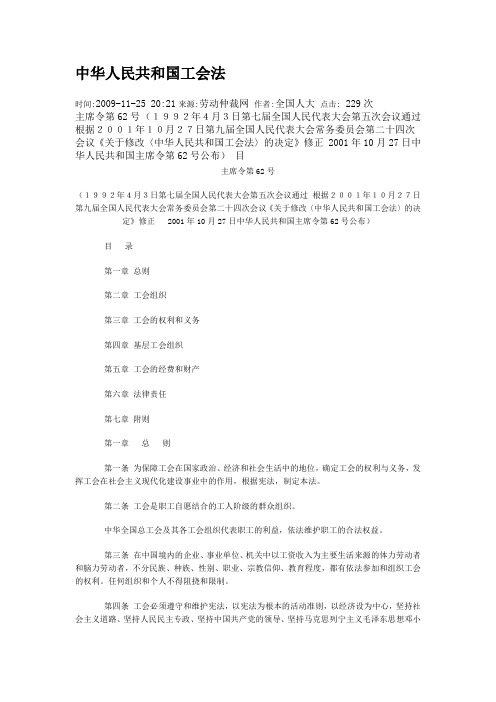
中华人民共和国工会法时间:2009-11-25 20:21来源:劳动仲裁网作者:全国人大点击:229次主席令第62号(1992年4月3日第七届全国人民代表大会第五次会议通过根据2001年10月27日第九届全国人民代表大会常务委员会第二十四次会议《关于修改〈中华人民共和国工会法〉的决定》修正 2001年10月27日中华人民共和国主席令第62号公布)目主席令第62号(1992年4月3日第七届全国人民代表大会第五次会议通过根据2001年10月27日第九届全国人民代表大会常务委员会第二十四次会议《关于修改〈中华人民共和国工会法〉的决定》修正 2001年10月27日中华人民共和国主席令第62号公布)目录第一章总则第二章工会组织第三章工会的权利和义务第四章基层工会组织第五章工会的经费和财产第六章法律责任第七章附则第一章总则第一条为保障工会在国家政治、经济和社会生活中的地位,确定工会的权利与义务,发挥工会在社会主义现代化建设事业中的作用,根据宪法,制定本法。
第二条工会是职工自愿结合的工人阶级的群众组织。
中华全国总工会及其各工会组织代表职工的利益,依法维护职工的合法权益。
第三条在中国境内的企业、事业单位、机关中以工资收入为主要生活来源的体力劳动者和脑力劳动者,不分民族、种族、性别、职业、宗教信仰、教育程度,都有依法参加和组织工会的权利。
任何组织和个人不得阻挠和限制。
第四条工会必须遵守和维护宪法,以宪法为根本的活动准则,以经济设为中心,坚持社会主义道路、坚持人民民主专政、坚持中国共产党的领导、坚持马克思列宁主义毛泽东思想邓小平理论,坚持改革开放,依照工会章程独立自主地开展工作。
工会会员全国代表大会制定或者修改《中国工会章程》,章程不得与宪法和法律相抵触。
国家保护工会的合法权益不受侵犯。
第五条工会组织和教育职工依照宪法和法律的规定行使民主权利,发挥国家主人翁的作用,通过各种途径和形式,参与管理国家事务、管理经济和文化事业、管理社会事务;协助人民政府开展工作,维护工人阶级领导的、以工农联盟为基础的人民民主专政的社会主国家政权。
全国人大法律委员会关于《中华人民共和国工会法修正案(草案)》审议结果的报告

全国人大法律委员会关于《中华人民共和国工会法修正案(草案)》审议结果的报告文章属性•【公布机关】全国人民代表大会•【公布日期】2001.10.22•【分类】审议意见正文全国人大法律委员会关于《中华人民共和国工会法修正案(草案)》审议结果的报告——2001年10月22日在第九届全国人民代表大会常务委员会第二十四次会议上全国人大法律委员会副主任委员乔晓阳全国人民代表大会常务委员会:九届全国人大常委会第二十三次会议对全国人大常委会委员长会议提请审议的工会法修正案(草案)进行了初步审议。
会后,法制工作委员会将草案印发中央有关部门、各地方及一些企业和研究机构征求意见。
法律委员会、内务司法委员会和法制工作委员会联合召开中央有关部门、企业有关负责人和专家座谈会,听取意见。
法制工作委员会还组织调查组赴南方进行了调查,进一步听取上海、江苏、四川等地方人大、企业及各级工会组织的意见。
在认真研究常委会组成人员和各方面意见的基础上,法律委员会于10月9日召开会议,对草案进行了逐条审议。
中华全国总工会的有关负责同志和全国人大内务司法委员会的有关同志列席了会议。
10月16日法律委员会再次进行了审议。
法律委员会认为,为了加强工会组织的建设,维护广大职工的合法权益,充分发挥工人阶级主人翁作用,解决工会工作面临的新问题,促进改革与经济发展,对工会法进行修改是十分必要的。
修正案草案修改得比较完善,内容可行,已基本成熟。
同时提出了以下修改意见:一、有些常委委员、地方和部门提出,目前在一些非公有制企业中,经理、厂长等主要负责人的配偶或兄弟姐妹等近亲属担任着工会主席,为使工会更有效地代表和维护职工的合法权益,法律应当针对这些现象,对担任工会委员会成员的人选作出限制性规定。
因此,法律委员会建议修正案草案增加一条规定:“企业主要负责人的近亲属不得作为基层工会委员会成员的人选。
”二、有的常委委员、地方提出,修正案草案第六条关于基层工会建制的规定中,只规定建立工会委员会,删去了现行工会法关于“工会会员不足二十五人的,可以选举组织员一人,开展活动”的规定。
《工会法》2001年修改的成功与不足

[编者按:目前,我国两亿多职工中还有一亿职工不是工会会员,劳动的组织仍然是一个大问题。
2001年工会法的修改仅仅加强了工会的维权作用,但对劳动者最基本的一项权利----罢工仍含糊其词。
在我国现阶段,罢工已是不容回避并且较为多见的事实,但在现行立法中却几乎是空白。
]《工会法》2001年修改的成功与不足湖南大学法学院教授、博士生导师王全兴* 汪敏**2005年3月20日摘要:2001年修改的《工会法》,突出了工会维护职工合法权益的职能,顺应了我国加入WTO的要求,但在罢工、工会会员资格、基层工会委员会成员资格、集体合同、职工民主管理等问题上还存在不足,需要进一步完善。
关键词:工会法2001年修改维权职能WTO 不足。
我国先后有两部《中华人民共和国工会法》(以下简称《工会法》),即1950年6月28日由中央人民政府委员会通过的《工会法》和1992年4月3日由第七届全国人大第五次会议通过的《工会法》。
1950年《工会法》是建国初期最早的三大法律之一,旨在保护先进生产力代表者——工人阶级的结社权和劳动权益,反映了当时“劳资两利”和“劳资协商”的特点。
1992年《工会法》是在经历了长期的计划经济体制后,商品经济发展到一定阶段,工会工作面临如何转轨以适应党的十一届三中全会以来新形势的需要这样的背景下,对1950年《工会法》作出全面修改而重新颁布的,它继承了1950年《工会法》的基本框架,同时增加了工会的性质、地位、任务以及权利义务等重要内容。
1992年《工会法》虽然体现了市场化经济体制改革的需要,但未能反映1992年10月中央明确提出的建立社会主义市场经济体制的精神。
由于社会主义市场经济的建立和完善,经济结构的战略性调整,公有制实现形式的多样化和非公有制经济的快速发展,经济关系和劳动关系发生了深刻变革。
1[1]因而,1992年《工会法》在实施中显现出一定的不适应性。
尤其是工会的基本职能不明确和法律责任不到位,工会干部和工会财产缺乏法律保护,工会组建规则不够细化等在新形势下出现的新问题,急需通过修改《工会法》来予以解决。
中华人民共和国工会法及相关法规制度

中华人民共和国工会法1992年4月3日第七届全国人民代表大会第五次会议通过根据2001年10月27日第九届全国人民代表大会常务委员会第二十四次会议《关于修改〈中华人民共和国工会法〉的决定》修正第一章总则第一条为保障工会在国家政治、经济和社会生活中的地位,确定工会的权利与义务,发挥工会在社会主义现代化建设事业中的作用,根据宪法,制定本法。
第二条工会是职工自愿结合的工人阶级的群众组织。
中华全国总工会及其各工会组织代表职工的利益,依法维护职工的合法权益。
第三条在中国境内的企业、事业单位、机关中以工资收入为主要生活来源的体力劳动者和脑力劳动者,不分民族、种族、性别、职业、宗教信仰、教育程度,都有依法参加和组织工会的权利。
任何组织和个人不得阻挠和限制。
第四条工会必须遵守和维护宪法,以宪法为根本的活动准则,以经济建设为中心,坚持社会主义道路、坚持人民民主专政、坚持中国共产党的领导、坚持马克思列宁主义毛泽东思想邓小平理论,坚持改革开放,依照工会章程独立自主地开展工作。
工会会员全国代表大会制定或者修改《中国工会章程》,章程不得与宪法和法律相抵触。
国家保护工会的合法权益不受侵犯。
第五条工会组织和教育职工依照宪法和法律的规定行使民主权利,发挥国家主人翁的作用,通过各种途径和形式,参与管理国家事务、管理经济和文化事业、管理社会事务;协助人民政府开展工作,维护工人阶级领导的、以工农联盟为基础的人民民主专政的社会主义国家政权。
第六条维护职工合法权益是工会的基本职责。
工会在维护全国人民总体利益的同时,代表和维护职工的合法权益。
工会通过平等协商和集体合同制度,协调劳动关系,维护企业职工劳动权益。
工会依照法律规定通过职工代表大会或者其他形式,组织职工参与本单位的民主决策、民主管理和民主监督。
工会必须密切联系职工,听取和反映职工的意见和要求,关心职工的生活,帮助职工解决困难,全心全意为职工服务。
第七条工会动员和组织职工积极参加经济建设,努力完成生产任务和工作任务。
中华人民共和国工会法(修正)

中华全国总工会及其各工会组织代表职工的利益,依法维护职工的合法权益。
第三条 在中国境内的企业、事业单位、机关中以工资收入为主要生活来源的体力劳动者和脑力劳动者,不分民族、种族、性别、职业、宗教信仰、教育程度,都有依法参加和组织工会的权利。任何组织和个人不得阻挠和限制。
第三十二条 根据政府委托,工会与有关部门共同做好劳动模范和先进生产(工作)者的评选、表彰、培养和管理工作。
第三十三条 国家机关在组织起草或者修改直接涉及职工切身利益的法律、法规、规章时,应当听取工会意见。
县级以上各级人民政府制定国民经济和社会发展计划,对涉及职工利益的重大问题,应当听取同级工会的意见。
各级工会委员会向同级会员大会或者会员代表大会负责并报告工作,接受其监督。
工会会员大会或者会员代表大会有权撤换或者罢免其所选举的代表或者工会委员会组成人员。
上级工会组织领导下级工会组织。
第十条 企业、事业单位、机关有会员二十五人以上的,应当建立基层工会委员会;不足二十五人的,可以单独建立基层工会委员会,也可以由两个以上单位的会员联合建立 基层工会委员会,也可以选举组织员一人,组织会员开展活动。女职工人数较多的,可以建立工会女职工委员会,在同级工会领导下开展工作;女职工人数较少的, 可以在工会委员会中设女职工委员。
第三十六条 集体企业的工会委员会,应当支持和组织职工参加民主管理和民主监督,维护职工选举和罢免管理人员、决定经营管理的重大问题的权力。
第三十七条 本法第三十五条、第三十六条规定以外的其他企业、事业单位的工会委员会,依照法律规定组织职工采取与企业、事业单位相适应的形式,参与企业、事业单位民主管理。
第三十八条 企业、事业单位研究经营管理和发展的重大问题应当听取工会的意见;召开讨论有关工资、福利、劳动安全卫生、社会保险等涉及职工切身利益的会议,必须有工会代表参加。
20011027中华人民共和国工会法

中华人民共和国工会法(1992年4月3日第七届全国人民代表大会第五次会议通过根据2001年10月27日第九届全国人民代表大会常务委员会第二十四次会议《关于修改〈中华人民共和国工会法〉的决定》修正)目录第一章总则第二章工会组织第三章工会的权利和义务第四章基层工会组织第五章工会的经费和财产第六章法律责任第七章附则第一章总则第一条为保障工会在国家政治、经济和社会生活中的地位,确定工会的权利与义务,发挥工会在社会主义现代化建设事业中的作用,根据宪法,制定本法。
第二条工会是职工自愿结合的工人阶级的群众组织。
中华全国总工会及其各工会组织代表职工的利益,依法维护职工的合法权益。
第三条在中国境内的企业、事业单位、机关中以工资收入为主要生活来源的体力劳动者和脑力劳动者,不分民族、种族、性别、职业、宗教信仰、教育程度,都有依法参加和组织工会的权利。
任何组织和个人不得阻挠和限制。
第四条工会必须遵守和维护宪法,以宪法为根本的活动准则,以经济建设为中心,坚持社会主义道路、坚持人民民主专政、坚持中国共产党的领导、坚持马克思列宁主义毛泽东思想邓小平理论,坚持改革开放,依照工会章程独立自主的开展工作。
工会会员全国代表大会制定或者修改《中国工会章程》,章程不得与宪法和法律相抵触。
国家保护工会的合法权益不受侵犯。
第五条工会组织和教育职工依照宪法和法律的规定行使民主权利,发挥国家主人翁的作用,通过各种途径和形式,参与管理国家事务、管理经济和文化事业、管理社会事务;协助人民政府开展工作,维护工人阶级领导的、以工农联盟为基础的人民民主专政的社会主义国家政权。
第六条维护职工合法权益是工会的基本职责。
工会在维护全国人民总体利益的同时,代表和维护职工的合法权益。
工会通过平等协商和集体合同制度,协调劳动关系,维护企业职工劳动权益。
工会依照法律规定通过职工代表大会或者其他形式,组织职工参与本单位的民主决策、民主管理和民主监督。
工会必须密切联系职工,听取和反应职工的意见和要求,关心职工的生活,帮助职工解决困难,全心全意为职工服务。
2001年工会法中英文对照

Trade Union Law of the People's Republic of China中华人民共和国工会法(2001年修订,英文版)Adopted on April 3, 1992 at the 5th Session of the 7th National People's CongressAmended according to the Decision on Amending the Trade Union Law of the People's Republic of China at the 24th Session of the Standing Committee of the 9th National People's Congress on October 27, 20011992年4月3日第七届全国人民代表大会第五次会议通过根据2001年10月27日第九届全国人民代表大会常务委员会第二十四次会议《关于修改〈中华人民共和国工会法〉的决定》修正Contents 目录Chapter I General Provisions第一章总则Chapter II Trade Union Organizations第二章工会组织Chapter III Rights and Obligations of a Trade Union第三章工会的权利和义务Chapter IV Basic-level Trade Union Organizations第四章基层工会组织Chapter V Trade Union Funds and Assets第五章工会的经费和财产Chapter VI Legal Responsibilities第六章法律责任Chapter VII Supplementary Provisions第七章附则Chapter I General ProvisionsArticle 1 This Law is formulated in accordance with the Constitution to protect the position of trade unions in State political, economic and social life, to clarify the rights and obligations of trade unions and to enable them to play their proper role in the development of China's socialist modernization.第一条为保障工会在国家政治、经济和社会生活中的地位,确定工会的权利与义务,发挥工会在社会主义现代化建设事业中的作用,根据宪法,制定本法。
中华人民共和国工会法
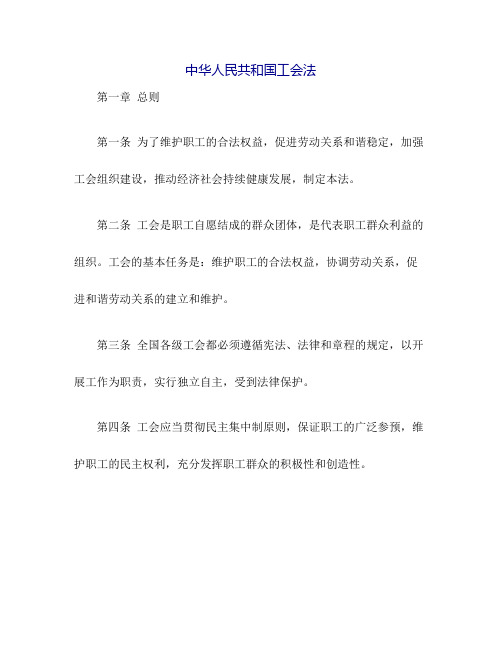
中华人民共和国工会法第一章总则第一条为了维护职工的合法权益,促进劳动关系和谐稳定,加强工会组织建设,推动经济社会持续健康发展,制定本法。
第二条工会是职工自愿结成的群众团体,是代表职工群众利益的组织。
工会的基本任务是:维护职工的合法权益,协调劳动关系,促进和谐劳动关系的建立和维护。
第三条全国各级工会都必须遵循宪法、法律和章程的规定,以开展工作为职责,实行独立自主,受到法律保护。
第四条工会应当贯彻民主集中制原则,保证职工的广泛参预,维护职工的民主权利,充分发挥职工群众的积极性和创造性。
第五条职工有权自愿参加工会,并享有工会提供的服务和保障。
用人单位不得因职工加入或者不加入工会而歧视、打压或者限制其合法权益。
第六条工会应当在全国范围内开展宣传教育活动,提高职工的法律意识和工会意识。
第二章工会组织第七条工会应当按照下列原则进行组织:(一)职工自愿参加;(二)地区、行业和不同层次的工会之间相互协作;(三)独立自主地处理工会事务;(四)实行民主管理,用人单位不得干涉和制约工会的活动。
第八条工会应当设立工会委员会,实行集体领导。
工会委员会由工会会员代表大会选举产生。
第九条工会应当设立必要的工会组织,如基层工会、中心工会和总工会等,并根据需要设立专业委员会。
第三章工会会员第十条工会会员是指因为劳动关系而加入工会的个人,是工会的基本组成部份。
第十一条工会会员应当享有以下基本权利:(一)参加工会活动并表达自己的意见;(二)选举和被选举为工会的职务;(三)在享受工会服务和保障的同时,缴纳工会会费。
第十二条工会会员应当履行以下基本义务:(一)遵守工会章程和决定;(二)支持和协助工会开展工作;(三)积极参加工会组织的各项活动,并积极建言献策。
第四章工会经费第十三条工会经费的筹集和使用必须遵守下列规定:(一)由正式工会会员自愿缴纳;(二)用于工会的日常活动和职工的福利事业;(三)接受社会监督和审计报告。
第五章工会的监督、调解和维权第十四条工会应当依据法律法规、章程和决定,对用人单位的劳动条件,劳动待遇、劳动保护等方面的情况进行监督检查和评估。
中华人民共和国工会法

【标题】中华人民共和国工会法(修正)【颁布日期】1992.04.03【实施日期】1992.04.03【失效日期】【法规分类】人大法律【内容分类】社团【颁布单位】全国人大【内容】(1992年4月3日第七届全国人民代表大会第五次会议通过根据2001年10月27日第九届全国人民代表大会常务委员会第二十四次会议《关于修改〈中华人民共和国工会法〉的决定》修正)目录第一章总则第二章工会组织第三章工会的权利和义务第四章基层工会组织第五章工会的经费和财产第六章附则第一章总则第六条维护职工合法权益是工会的基本职责。
工会在维护全国人民总体利益的同时,代表和维护职工的合法权益。
工会通过平等协商和集体合同制度,协调劳动关系,维护企业职工劳动权益。
工会依照法律规定通过职工代表大会或者其他形式,组织职工参与本单位的民主决策、民主管理和民主监督。
工会必须密切联系职工,听取和反映职工的意见和要求,关心职工的生活,帮助职工解决困难,全心全意为职工服务。
第三章工会的权利和义务第十九条企业、事业单位违反职工代表大会制度和其他民主管理制度,工会有权要求纠正,保障职工依法行使民主管理的权利。
法律、法规规定应当提交职工大会或者职工代表大会审议、通过、决定的事项,企业、事业单位应当依法办理。
第二十一条企业、事业单位处分职工,工会认为不适当的,有权提出意见。
企业单方面解除职工劳动合同时,应当事先将理由通知工会,工会认为企业违反法律、法规和有关合同,要求重新研究处理时,企业应当研究工会的意见,并将处理结果书面通知工会。
职工认为企业侵犯其劳动权益而申请劳动争议仲裁或者向人民法院提起诉讼的,工会应当给予支持和帮助。
第二十二条企业、事业单位违反劳动法律、法规规定,有下列侵犯职工劳动权益情形,工会应当代表职工与企业、事业单位交涉,要求企业、事业单位采取措施予以改正;企业、事业单位应当予以研究处理,并向工会作出答复;企业、事业单位拒不改正的,工会可以请求当地人民政府依法作出处理:(一)克扣职工工资的;(二)不提供劳动安全卫生条件的;(三)随意延长劳动时间的;(四)侵犯女职工和未成年工特殊权益的;(五)其他严重侵犯职工劳动权益的。
关于《中华人民共和国工会法(修正草案)》的说明

关于《中华人民共和国工会法(修正草案)》的说明文章属性•【公布机关】全国人大常委会,全国人大常委会,全国人大常委会•【公布日期】2021.12.20•【分类】立法草案及其说明正文关于《中华人民共和国工会法(修正草案)》的说明——2021年12月20日在第十三届全国人民代表大会常务委员会第三十二次会议上全国人大常委会法制工作委员会副主任张勇委员长、各位副委员长、秘书长、各位委员:我受委员长会议委托,作关于《中华人民共和国工会法(修正草案)》的说明。
一、修改的背景和过程《中华人民共和国工会法》(以下简称工会法)是明确工会法律地位和工作职责的重要法律,是工会组织依法开展工作的重要制度保障。
现行工会法于1992年公布施行,2001年、2009年进行了两次修改。
工会法实施以来,为各级工会履行团结引导职工群众听党话跟党走的政治责任提供了有力法治保障,在发挥工会职能作用、维护职工合法权益、构建和谐劳动关系等方面起到了有力的推动作用,总体上适应经济社会发展需要。
党的十八大以来,党和国家事业取得历史性成就、发生历史性变革,对工会工作提出了新要求。
习近平新时代中国特色社会主义思想已经写入党章、宪法,成为党和国家长期坚持的指导思想,也是工会组织和工会工作必须长期坚持的指导思想。
习近平总书记对坚持党对工会工作的领导提出明确要求,指出工会要认真履行维护职工合法权益、竭诚服务职工群众的基本职责,构建联系广泛、服务职工的工会工作体系,切实保持和增强政治性、先进性、群众性。
各级工会在推进产业工人队伍建设改革和工会改革中也积累了宝贵经验。
有必要通过修改工会法,贯彻落实党中央决策部署和习近平总书记重要指示精神,及时将行之有效的经验做法上升为法律规定。
2019年以来,全国人大常委会法工委和全国总工会密切沟通,围绕工会法修改作了比较充分的准备工作。
2019年上半年,全国总工会在全国范围内开展了工会法实施情况专题调研,广泛听取各级工会组织、广大职工群众和社会各方面的意见建议,在此基础上形成修正草案建议稿。
中华人民共和国工会法 (修正本)-English
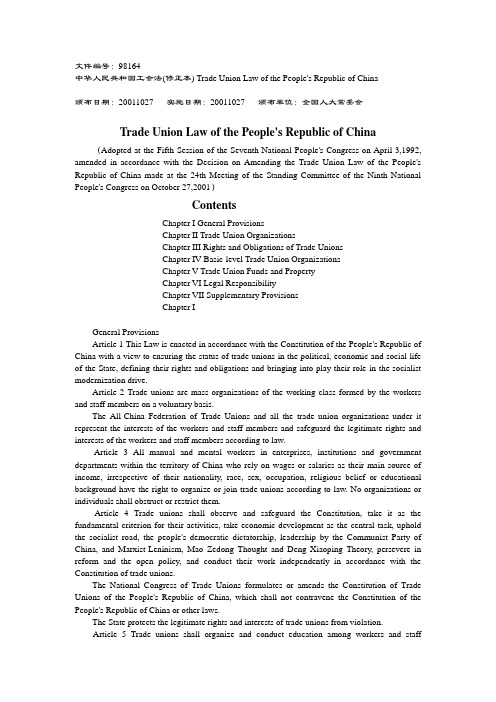
文件编号:98164中华人民共和国工会法(修正本) Trade Union Law of the People's Republic of China颁布日期:20011027 实施日期:20011027 颁布单位:全国人大常委会Trade Union Law of the People's Republic of China(Adopted at the Fifth Session of the Seventh National People's Congress on April 3,1992, amended in accordance with the Decision on Amending the Trade Union Law of the People's Republic of China made at the 24th Meeting of the Standing Committee of the Ninth National People's Congress on October 27,2001)ContentsChapter I General ProvisionsChapter II Trade Union OrganizationsChapter III Rights and Obligations of Trade UnionsChapter IV Basic-level Trade Union OrganizationsChapter V Trade Union Funds and PropertyChapter VI Legal ResponsibilityChapter VII Supplementary ProvisionsChapter IGeneral ProvisionsArticle 1 This Law is enacted in accordance with the Constitution of the People's Republic of China with a view to ensuring the status of trade unions in the political, economic and social life of the State, defining their rights and obligations and bringing into play their role in the socialist modernization drive.Article 2 Trade unions are mass organizations of the working class formed by the workers and staff members on a voluntary basis.The All-China Federation of Trade Unions and all the trade union organizations under it represent the interests of the workers and staff members and safeguard the legitimate rights and interests of the workers and staff members according to law.Article 3 All manual and mental workers in enterprises, institutions and government departments within the territory of China who rely on wages or salaries as their main source of income, irrespective of their nationality, race, sex, occupation, religious belief or educational background have the right to organize or join trade unions according to law. No organizations or individuals shall obstruct or restrict them.Article 4 Trade unions shall observe and safeguard the Constitution, take it as the fundamental criterion for their activities, take economic development as the central task, uphold the socialist road, the people's democratic dictatorship, leadership by the Communist Party of China, and Marxist-Leninism, Mao Zedong Thought and Deng Xiaoping Theory, persevere in reform and the open policy, and conduct their work independently in accordance with the Constitution of trade unions.The National Congress of Trade Unions formulates or amends the Constitution of Trade Unions of the People's Republic of China, which shall not contravene the Constitution of the People's Republic of China or other laws.The State protects the legitimate rights and interests of trade unions from violation.Article 5 Trade unions shall organize and conduct education among workers and staffmembers in order that they shall, in accordance with the provisions of the Constitution of the People's Republic of China and other laws, give play to their role as masters of the country and participate in various ways and forms in the administration of State affairs, management of economic and cultural undertakings and handling of social affairs; trade unions shall assist the people's government in their work and safeguard the socialist State power under the people's democratic dictatorship led by the working class and based on the alliance of workers and peasants.Article 6 The basic duties and functions of trade unions are to safeguard the legitimate rights and interests of workers and staff members. While protecting the overall interests of the entire Chinese people, trade unions shall represent and safeguard the legitimate rights and interests of workers and staff members.Trade unions shall coordinate labor relations and safeguard the rights and interests enjoyed in work by the workers and staff members of enterprises through consultation at an equal footing and the collective contract system.Trade unions shall, in accordance with the provision of laws and through the congresses of the workers and staff members or other forms, organize the workers and staff members to participate in democratic decision-making and management of and democratic supervision over their own work units.Trade unions shall maintain close ties with workers and staff members, solicit and voice their opinions and demands, show concern for their everyday life, help them solve their difficulties and serve them wholeheartedly.Article 7 Trade unions shall mobilize and organize workers and staff members to take an active part in economic development and to strive to fulfill their tasks in production and other work. Trade unions shall educate workers and staff members constantly in the need to improve their ideological, ethical, technical, professional, scientific and cultural qualities, in order to build a contingent team of well-educated and self-disciplined workers and staff members with lofty ideals and moral integrity.Article 8 The All-China Federation of Trade Unions shall, on the principle of independence, equality, mutual respect and non-interference in each other's internal affairs, strengthen friendly and cooperative relations with trade union organizations of other countries.Chapter IITrade Unions OrganizationsArticle 9 Trade union organizations at various levels shall be established according to the principle of democratic centralism.Trade union committees at various levels shall be democratically elected at members' assemblies or members' congresses. No close relatives of the chief members of an enterprise may be candidates for members of the basic-level trade union committee of the enterprise.Trade union committees at various levels shall be accountable, and report their work, to the members' assemblies or members' congresses at their respective levels and be subjected to their supervision as well.Trade union members' assemblies or congresses shall have the right to remove or recall the representatives or members of trade union committees they elected.A trade union organization at a higher level shall exercise leadership over a trade union organization at a lower level.Article 10 A basic-level trade union committee shall be set up in an enterprise, an institution or a government department with a membership of twenty-five or more; where the membership is less than twenty-five, a basic-level trade union committee may be separately set up, or a basic-level trade union committee may be set up jointly by the members in two or more work units,or an organizer may be elected, to organize the members in various activities. Where female workers and staff members are relatively large in number, a trade union committee for female workers and staff members may be set up, which shall carry out its work under the leadership of the trade union at the corresponding level; where they are relatively small in number, there may be a member in charge of the female workers and staff members on a trade union committee.In townships, towns or in urban neighborhoods, where workers and staff members of enterprises are relatively large in number, joint basic-level trade union federations may be set up.Local trade union federations shall be established in places at or above the county level.Industrial trade unions may be formed, when needed, at national or local levels for a single industry or several industries of a similar nature.The All-China Federation of Trade Unions shall be established as the unified national organization.Article 11 The establishment of basic-level trade union organizations, local trade union federations, and national or local industrial trade union organizations shall be submitted to the trade union organization at the next higher level for approval.Trade union organizations at higher levels may dispatch their members to assist and guide the workers and staff members of enterprises to set up their trade unions, no units or individuals may obstruct the effort.Article 12 No organizations or individuals may dissolve or merge trade union organizations at will.A basic-level trade union organization shall be dissolved accordingly when the enterprise or institution or government department to which it belongs is terminated or dissolved, and the matter shall be reported to the trade unions organization at the next higher level.The membership of the members of the dissolved trade union organization specified in the provisions of the preceding paragraph may be retained, and the specific administrative measures in this regard shall be formulated by the All-China Federation of Trade Unions.Article 13 For a trade union in an enterprise or institution with two hundred and more workers and staff members, there may be a full-time chairman. The number of the full-time functionaries of a trade union shall be determined by the trade union together with the enterprise or institution through consultation.Article 14 The All-China Federation of Trade Unions, a local trade union federation or an industrial trade union enjoys the status of a legal person in the capacity of a public organization.A basic-level trade union organization, which has acquired the qualifications of a legal person as prescribed in the General Principles of the Civil Law, shall, in accordance with law, be granted the status of a legal person as a public organization.Article 15 The term of office of the basic-level trade union committee is three or five years. The term of office of the committees of the local trade union federations at different levels and of the industrial trade union organizations is five years.Article 16 Basic-level trade union committee shall convene member's assemblies or members' congresses at regular intervals, at which major issues related to the work of trade union organizations shall be discussed and decided. Upon the proposal made by a basic-level trade union committee or over one-third of the trade union members, a provisional members' assembly or members' congress may be convened.Article 17 No trade union chairman or vice-chairman may be arbitrarily transferred to another unit before the expiration of his tenure of office. When such a transfer is prompted by the need of work, it shall be subject to approval by the trade union committee at the corresponding level and the trade union at the next higher level.The recall of the chairman or vice-chairman of a trade union must be discussed at themembers' assembly or members' congress, and no such recall shall be made without approval by more than half of all the members at the assembly or congress.Article 18 The term of labor contract for the full-time chairman, vice-chairman or member of a basic-level trade union shall be automatically extended from the date he assumes the office, and the term extended shall be equal to the term of office; if the term of labor contract left to be served by a chairman, vice-chairman or member is shorter than the term of office from the date he the assumes the office, the term of the labor contract shall be automatically extended to the expiration of the term of office, except that he commits serious mistakes during the term of office or reaches the statutory age for retirement.Chapter IIIRights and Obligations of Trade UnionsArticle 19 If an enterprise or institution acts in contravention to the system of the congress of workers and staff members or other systems of democratic management, the trade union shall have the right to demand rectification so as to ensure the workers and staff members the exercise of their right in democratic management as prescribed by law.For matters which should be submitted to the assembly or congress of workers and staff members for deliberation, adoption or decision, as prescribed by laws and regulations, enterprises or institutions shall do so accordingly.Article 20 Trade unions shall assist and guide workers and staff members in signing labor contracts with enterprises or institutions managed as enterprises.Trade unions shall, on behalf of the workers and staff members, make equal consultations and sign collective contracts with enterprises or institutions under enterprise-style management. The draft collective contracts shall be submitted to the congresses of the workers and staff members or all the workers and staff members for deliberation and approval.When trade unions sign collective contracts, trade unions at higher levels shall afford support and assistance to them.If an enterprise infringes upon labor rights and interests of the workers and staff members in violation of the collective contract, the trade union may, according to law, demand the enterprise to assume the responsibilities for its acts; if the disputes arising from the performance of the collective contract fail to be settled through consultations, the trade union may submit them to the labor dispute arbitration bodies for arbitration; if the arbitration bodies refuse to accept the case or the trade union is not satisfied with the arbitral ruling, the trade union may bring the case before a People's Court.Article 21 If an enterprise or institution punishes a worker or staff member in a manner that the trade union considers improper, the trade union shall have the right to advance its opinion.Before unilaterally deciding to dissolve the labor contract with a worker or staff member, the enterprise shall inform the trade union of the reasons why; and, if the trade union considers that the enterprise violates laws, regulations or the contract in question and demands that it reconsider the matter, the enterprise shall study the opinion of the trade union, and inform the trade union of its final decision in writing.Where a worker or staff member believes that the enterprise infringes upon his labor rights and interests and therefore applies for labor dispute arbitration or brings the case before a People's Court, the trade union shall give him support and assistance.Article 22 If an enterprise or institution, in violation of laws and regulations on labor, infringes upon the labor rights and interests of the workers and staff members in any of the following ways, the trade union shall, on behalf of the workers and staff members, make representations to the enterprise or institution and demand that it take measures for rectification; the enterprise or institution shall review and handle the matter, and give a reply to the trade union;if the enterprise or institution refuses to make rectification, the trade union may apply to the local people's government for a decision accordance to law:(1)embezzling part of the wages of the workers and staff members;(2)failing to provide occupational safety and health conditions;(3)arbitrarily extending working hours;(4)infringing upon the special rights and interests of female workers and staff members as well as the minor workers; or(5)seriously infringing upon other labor rights and interests of the workers and staff members.Article 23 Trade unions shall, in accordance with State regulations, see to it that the working conditions and occupational safety and health facilities for enterprises under construction or expansion and for technological transformation projects are designed, built and put into operation or use simultaneously with the main parts of projects. The enterprises or the competent departments shall give serious consideration to the opinions put forth by the trade unions, and inform the trade unions of the results of their consideration in writing.Article 24 When the trade union finds that the enterprise gives a command contrary to the established rules and compels workers to operate under unsafe conditions, or when major hidden dangers and occupational hazards are found in the course of production, the trade union shall have the right to put forward proposals for a solution, and the enterprise shall, without delay, consider the proposals and give a reply to the trade union. Where the very lives of the workers and staff members are found to be in danger, the trade union shall have the right to make a proposal to the enterprise that a withdrawal of the workers and staff members from the dangerous site be organized, and the enterprise shall make a decision promptly.Article 25 Trade unions shall have the right to investigate into the infringements upon the legitimate rights and interests of the workers and staff members by enterprises or institutions, and the units concerned shall give them assistance.Article 26 Trade unions shall participate in investigation into and settlement of job-related accidents causing death or injures to workers and staff members and in investigation into and solution of other problems seriously endangering the health of workers and staff members. Trade unions shall make proposals for solutions to the departments concerned, and have the right to demand that the persons who are directly in charge and the other persons who are responsible be investigated for their liabilities. The proposals put forth by trade unions shall be considered and replies be given without delay.Article 27 In case of work-stoppage or slow-down strike in an enterprise or institution, the trade union shall, on behalf of the workers and staff members, hold consultation with the enterprise or institution or the parties concerned, present the opinions and demands of the workers and staff members, and put forth proposals for solutions. With respect to the reasonable demands made by the workers and staff members, the enterprise or institution shall try to satisfy them. The trade union shall assist the enterprise or institution in properly dealing with the matter so as to help restore the normal order of production and other work as soon as possible.Article 28 Trade unions shall participate in the conciliation of labor disputes in enterprises.Local labor dispute arbitration bodies shall include representatives of trade unions at the corresponding levels.Article 29 Trade union federations at or above the county level may provide legal services to their affiliated trade unions and workers and staff members.Article 30 Trade unions shall assist enterprises, institutions and government departments in providing adequate collective welfare services to the workers and staff members and in properly dealing with matters concerning wages, occupational safety and health as well as social insurance.Article 31 Trade unions shall, in conjunction with enterprises and institutions, conduct education among the workers and staff members in the need to do their work and protect the property of the enterprises and the State in the attitude of masters of the country, mobilize the masses of workers and staff members in activities to make rational proposals and technical renovations and in sparetime cultural and technical studies and vocational training, and also in recreational and sports activities.Article 32 Entrusted by the government, trade unions shall, together with relevant departments, do a good job of choosing, commending, cultivating and administering model workers and advanced producers(workers).Article 33 When organizing people to draft or revise laws, regulations or rules directly related to the immediate interests of workers and staff members, the government departments shall listen to the opinions of trade unions.When working out plans for national economic and social development, the people's governments at or above the county level shall, where major questions related to the interests of workers ansdstaff members are concerned, listen to the opinions of the trade unions at the corresponding levels.When studying and working out policies and measures on employment, wages, occupational safety and health, social insurance, and other questions related to the immediate interests of workers and staff members, the people's governments at or above the county level and their relevant departments shall invite the trade unions at the corresponding levels to take part in the study and listen to their opinions.Article 34 The people's government at or above the county level may, through meetings or by other appropriate ways, inform the trade unions at the corresponding levels of their important work programmes and administrative measures related to trade union work, analyse and settle the problems as reflected in the opinions and aspirations of the masses of the workers and staff members conveyed by trade unions.Administrative departments for labor under the people's government at various levels shall, together with the trade unions at the corresponding levels and the representatives of enterprises, establish trilateral consultation mechanisms on labor relations and jointly analyse and settle major issues regarding labor relations.Chapter IVBasic-level Trade Union OrganizationsArticle 35 In a State-owned enterprise, the congress of the workers and staff members is the basic form of democratic management of the enterprise and the organ by which the workers and staff members exercise their right to democratic management, and discharges its functions and powers in accordance with the provisions of laws.The trade union committee of the State-owned enterprise is the working body of the congress of the workers and staff members and takes care of the day-to-day work of the congress, checks and supervises the implementation of the resolutions adopted by the congress.Article 36 The trade union committee of a collectively owned enterprise shall support and organize the participation of the workers and staff members in democratic management and democratic supervision, and defend their rights in electing, removing managerial personnel and deciding on major questions concerning operation and management.Article 37 Trade union committee of enterprises or institutions other than the ones specified in Article 35 and 36 of this Law shall, in accordance with the provisions of laws, organize the participation of the workers and staff members in democratic management of the enterprises and institutions by ways appropriate to the enterprises or institutions.Article 38 When discussing major issues on operation, management and development, theenterprise or institution shall listen to the opinions of trade union. The trade union in an enterprise or institution shall have its representative(s)attending any meetings held by the enterprise or institution to discuss matters on wages, welfare, occupational safely and health, social insurance and other questions related to the immediate interests of the workers and staff members.An enterprise or institution shall support the trade union in carrying out its activities in accordance with law, and the trade union shall support the enterprise or institution in exercising its power of operation and management in accordance with law.Article 39 Election of the representative(s)from among the workers and staff members to the board of directors or the board of supervisors of a company shall be conducted in accordance with the relevant provisions of the Company Law.Article 40 Basic-level trade union committees shall hold meetings or organize activities for workers and staff members outside production-or work-hours; when such meetings or activities are to take up production-or work-hours, they shall seek prior consent from the enterprises or institutions.Part-time committee members of basic-level trade unions shall receive their normal wages, and their other benefits shall remain unaffected if the meetings they attend or the trade union work they do during production-or work-hours take up not more than three working days every month.Article 41 Full-time functionaries of trade union committees in enterprises, institutions and government departments shall have their wages, bonuses and subsidies paid by the units to which they belong. They shall enjoy the same social insurance and other welfare benefits as the other workers and staff members of their units.Chapter VTrade Union Funds and PropertyArticle 42 The sources of trade union funds are as follows:(1)membership dues paid by union members;(2)contribution, equivalent to two percent of the monthly payroll of all the workers and staff members, allocated by the enterprise, institution or government department where the trade union is established;(3)incomes derived from enterprises and undertakings run by trade unions;(4)subsidies provided by the people's government; and(5)other incomes.The contribution allocated by the enterprises or institutions, as specified in Subparagraph(2)of the preceding paragraph, shall be listed and allocated before tax.Trade union funds shall mainly be used in the service of the workers and staff members and for activities sponsored by trade unions. Measures for the use of trade union funds shall be formulated by the All-China Federation of Trade Unions.Article 43 Where an enterprise or institution delays allocating or refuses to allocate the contribution to the trade union without justifiable reasons, the basic-level trade union or the trade union at a higher level may apply to the local People's Court for an order for payment; if it refuses to obey the order, the trade union may, in accordance with law, apply to the People's Court for compulsory enforcement.Article 44 Trade unions shall establish budgets, final accounts and auditing and supervisory systems based on the principle of financial autonomy.For trade unions at various levels, auditing commissions shall be set up.Trade unions various levels shall subject their incomes and expenditures to examination by the auditing commissions at the corresponding levels, report them regularly to the members' assemblies or congresses and receive their supervision. The trade union members' assemblies orcongresses shall have the right to express their opinions on the use of funds.The use of trade union funds shall be subject to State supervision according to law.Article 45 People's government at various levels and enterprises, institutions and government departments shall make available such necessary material means as facilities and places for trade unions to function and conduct their activities.Article 46 No trade unions' property, funds, or immovable property allocated by the State may be embezzled, diverted to other uses or arbitrarily disposed of, by any organization or individual.Article 47 No enterprises or institutions run by trade unions to serve the workers and staff members may have their affiliation changed arbitrarily.Article 48 Retired trade union functionaries at or above the county level shall enjoy the same treatment as retired functionaries of government departments do.Chapter VILegal ResponsibilityArticle 49 Where their legitimate rights and interests are infringed upon in violation of the provisions of this Law, the trade unions shall have the right to submit the matter to people's governments or relevant departments for solution, or to bring the case before a People's Court.Article 50 Any organization or individual that, in violation of the provisions of Article 3 and 11 of this Law, obstructs the workers' and staff members' from joining or organizing of trade unions in accordance with law or the effort made by trade unions at higher levels to assist and guide the workers and staff members in establishing trade unions shall be ordered to by the administrative department for labor to make rectification; if it refuses to do so, the said department may apply to the people's government at or above the county level for solution; where grave consequences are caused as a result of the use of such means as violence and threat in obstruction and thus a crime is constituted, criminal responsibility shall be investigated according to law.Article 51 Any organization that, in violation of the provisions of this Law, retaliate the functionaries of trade unions who perform their duties and functions according to law by transferring them to other posts without justifiable reasons shall be ordered by the administrative department for labor to rectify and reinstate the functionaries; if losses are caused therefrom, compensation shall be made to them.Anyone who humiliates, slanders or inflict injuries upon the functionaries of trade unions who perform their duties and functions according to law, which constitutes a crime, shall be investigated for criminal responsibility according to law; if the case is not serious enough to constitute a crime, he shall be punished by the public security organ in accordance with the regulations on administrative penalties for public security.Article 52 In any of the following cases in which the provisions of this Law are violated, the administrative department for labor shall order that the victim be reinstated, his remuneration payable during the period of the termination of the labor contract be made up, or that a compensation two times the amount of his annual income be given:(1)the labor contract of a worker or staff member if terminated due to his participation in trade union activities; or(2)the labor contract of a trade union functionary is terminated due to the performance of his duties and functions prescribed by this Law.Article 53 Any organization or individual that, in violation of the provisions of this Law, commits one of the following acts shall be ordered by the people's government at or above the county level to rectify, and the said government shall handle the case according to law:(1)preventing a trade union from mobilizing the workers and staff members to exercise, according to law, their democratic rights through the congress of the workers and staff members。
中华人民共和国工会法(2001年修正)

中华人民共和国工会法(2001年修正)文章属性•【制定机关】全国人民代表大会•【公布日期】2001.10.27•【文号】主席令第62号•【施行日期】2001.10.27•【效力等级】法律•【时效性】已被修改•【主题分类】工会正文中华人民共和国工会法(1992年4月3日第七届全国人民代表大会第五次会议通过根据2001年10月27日第九届全国人民代表大会常务委员会第二十四次会议《关于修改〈中华人民共和国工会法〉的决定》修正)目录第一章总则第二章工会组织第三章工会的权利和义务第四章基层工会组织第五章工会的经费和财产第六章法律责任第七章附则第一章总则第一条为保障工会在国家政治、经济和社会生活中的地位,确定工会的权利与义务,发挥工会在社会主义现代化建设事业中的作用,根据宪法,制定本法。
第二条工会是职工自愿结合的工人阶级的群众组织。
中华全国总工会及其各工会组织代表职工的利益,依法维护职工的合法权益。
第三条在中国境内的企业、事业单位、机关中以工资收入为主要生活来源的体力劳动者和脑力劳动者,不分民族、种族、性别、职业、宗教信仰、教育程度,都有依法参加和组织工会的权利。
任何组织和个人不得阻挠和限制。
第四条工会必须遵守和维护宪法,以宪法为根本的活动准则,以经济建设为中心,坚持社会主义道路、坚持人民民主专政、坚持中国共产党的领导、坚持马克思列宁主义毛泽东思想邓小平理论,坚持改革开放,依照工会章程独立自主地开展工作。
工会会员全国代表大会制定或者修改《中国工会章程》,章程不得与宪法和法律相抵触。
国家保护工会的合法权益不受侵犯。
第五条工会组织和教育职工依照宪法和法律的规定行使民主权利,发挥国家主人翁的作用,通过各种途径和形式,参与管理国家事务、管理经济和文化事业、管理社会事务;协助人民政府开展工作,维护工人阶级领导的、以工农联盟为基础的人民民主专政的社会主义国家政权。
第六条维护职工合法权益是工会的基本职责。
工会在维护全国人民总体利益的同时,代表和维护职工的合法权益。
中华人民共和国工会法

中华人民共和国工会法目录目录第一章总则第二章工会组织第三章工会的权利和义务第四章基层工会组织第五章工会的经费和财产第六章附则中华人民共和国工会法(1992年4月3日第七届全国人民代表大会第五次会议通过,1992年4月3日中华人民共和国主席令第五十七号公布,1992年4月3日起施行)目录第一章总则第二章工会组织第三章工会的权利和义务第四章基层工会组织第五章工会的经费和财产第六章附则第一章总则第一条为保障工会在国家政治、经济和社会生活中的地位,确定工会的权利与义务,发挥工会在社会主义现代化建设事业中的作用,根据宪法,制定本法。
第二条工会是职工自愿结合的工人阶级的群众组织。
第三条在中国境内的企业、事业单位、机关中以工资收入为主要生活来源的体力劳动者和脑力劳动者,不分民族、种族、性别、职业、宗教信仰、教育程度,都有依法参加和组织工会的权利。
第四条工会必须遵守和维护宪法,以宪法为根本的活动准则,依照工会章程独立自主地开展工作。
工会会员全国代表大会制定或者修改《中国工会章程》,章程不得与宪法和法律相抵触。
国家保护工会的合法权益不受侵犯。
第五条工会组织和教育职工依照宪法和法律的规定行使民主权利,发挥国家主人翁的作用,通过各种途径和形式,参与管理国家事务,管理经济和文化事业,管理社会事务;协助人民政府开展工作,维护工人阶级领导的、以工农联盟为基础的人民民主专政的社会主义国家政权。
第六条工会在维护全国人民总体利益的同时,维护职工的合法权益。
工会必须密切联系职工,听取和反映职工的意见和要求,关心职工的生活,帮助职工解决困难,全心全意为职工服务。
第七条全民所有制和集体所有制企业事业单位的工会,组织职工依照法律规定参加本单位的民主管理和民主监督。
第八条工会动员和教育职工以主人翁态度对待劳动,爱护国家和企业的财产,遵守劳动纪律,发动和组织职工努力完成生产任务和工作任务。
工会组织职工开展社会主义劳动竞赛,开展群众性的合理化建议、技术革新和技术协作的活动,提高劳动生产率和经济效益,发展社会生产力。
1992年4月3日第七届全国人民代表大会第五次会议通过 根据2001年10月27日第九届全国人民代
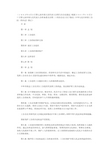
(1992年4月3日第七届全国人民代表大会第五次会议通过根据2001年10月27日第九届全国人民代表大会常务委员会第二十四次会议《关于修改〈中华人民共和国工会法〉的决定》修正)目录第一章总则第二章工会组织第三章工会的权利和义务第四章基层工会组织第五章工会的经费和财产第六章法律责任第七章附则第一章总则第一条为保障工会在国家政治、经济和社会生活中的地位,确定工会的权利与义务,发挥工会在社会主义现代化建设事业中的作用,根据宪法,制定本法。
第二条工会是职工自愿结合的工人阶级的群众组织。
中华全国总工会及其各工会组织代表职工的利益,依法维护职工的合法权益。
第三条在中国境内的企业、事业单位、机关中以工资收入为主要生活来源的体力劳动者和脑力劳动者,不分民族、种族、性别、职业、宗教信仰、教育程度,都有依法参加和组织工会的权利。
任何组织和个人不得阻挠和限制。
第四条工会必须遵守和维护宪法,以宪法为根本的活动准则,以经济建设为中心,坚持社会主义道路、坚持人民民主专政、坚持中国共产党的领导、坚持马克思列宁主义毛泽东思想邓小平理论,坚持改革开放,依照工会章程独立自主地开展工作。
工会会员全国代表大会制定或者修改《中国工会章程》,章程不得与宪法和法律相抵触。
国家保护工会的合法权益不受侵犯。
第五条工会组织和教育职工依照宪法和法律的规定行使民主权利,发挥国家主人翁的作用,通过各种途径和形式,参与管理国家事务、管理经济和文化事业、管理社会事务;协助人民政府开展工作,维护工人阶级领导的、以工农联盟为基础的人民民主专政的社会主义国家政权。
第六条维护职工合法权益是工会的基本职责。
工会在维护全国人民总体利益的同时,代表和维护职工的合法权益。
工会通过平等协商和集体合同制度,协调劳动关系,维护企业职工劳动权益。
工会依照法律规定通过职工代表大会或者其他形式,组织职工参与本单位的民主决策、民主管理和民主监督。
工会必须密切联系职工,听取和反映职工的意见和要求,关心职工的生活,帮助职工解决困难,全心全意为职工服务。
2001年工会法中英文对照讲述
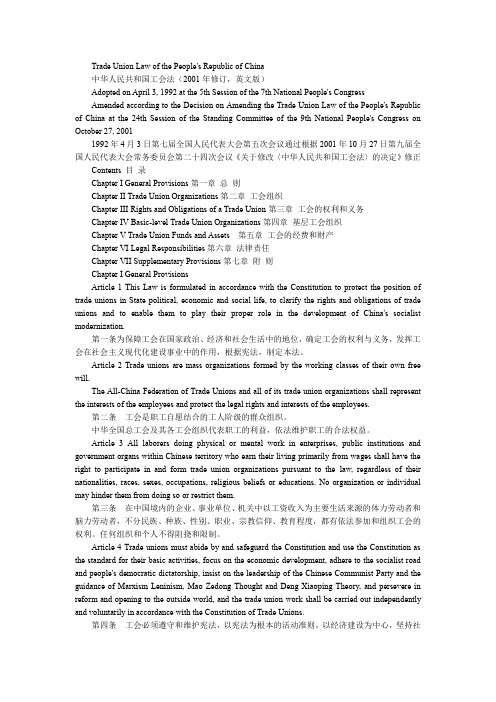
Trade Union Law of the People's Republic of China中华人民共和国工会法(2001年修订,英文版)Adopted on April 3, 1992 at the 5th Session of the 7th National People's CongressAmended according to the Decision on Amending the Trade Union Law of the People's Republic of China at the 24th Session of the Standing Committee of the 9th National People's Congress on October 27, 20011992年4月3日第七届全国人民代表大会第五次会议通过根据2001年10月27日第九届全国人民代表大会常务委员会第二十四次会议《关于修改〈中华人民共和国工会法〉的决定》修正Contents 目录Chapter I General Provisions第一章总则Chapter II Trade Union Organizations第二章工会组织Chapter III Rights and Obligations of a Trade Union第三章工会的权利和义务Chapter IV Basic-level Trade Union Organizations第四章基层工会组织Chapter V Trade Union Funds and Assets第五章工会的经费和财产Chapter VI Legal Responsibilities第六章法律责任Chapter VII Supplementary Provisions第七章附则Chapter I General ProvisionsArticle 1 This Law is formulated in accordance with the Constitution to protect the position of trade unions in State political, economic and social life, to clarify the rights and obligations of trade unions and to enable them to play their proper role in the development of China's socialist modernization.第一条为保障工会在国家政治、经济和社会生活中的地位,确定工会的权利与义务,发挥工会在社会主义现代化建设事业中的作用,根据宪法,制定本法。
工会法最近哪年修订的?

⼯会法最近哪年修订的? ⼯会法最近哪年修订的?下⾯就由⼩编⾼速⼤家吧。
⼯会法最新修改的是2001年。
2001年10⽉27⽇第九届全国⼈⼤常委会第⼆⼗四次会议通过并颁布的《中华⼈民共和国⼯会法》(以下简称新《⼯会法》)是在我国顺利跨⼊新世纪,我国政治、经济和社会状况都发⽣了巨⼤的、深刻的变化,建⽴和建设社会主义市场经济新体制的新形势下颁布的。
新修订的《⼯会法》共七章,五⼗七条。
这次对1992布的《⼯会法》的修改共有四⼗四条,新修改后的《⼯会法》有以下特点: 既适应了建⽴和发展社会主义市场经济体制、经济结构的调整、公有制实现形式多元化的实际情况,⼜突出针对了⽇益复杂多变的劳动关系; 突出了⼯会的维护职能,明确了职⼯代表⼤会制度和集体合同制度这两个主要维权⼿段,强化了⼯会组织建设,为最⼤限度地把⼴⼤职⼯组织到⼯会中来提供了法律依据和保障; 加⼤了对⼯会⼲部的保护⼒度,强化了具体保护措施,使⼯会⼲部可以更加尽职尽责地履⾏⼯会的职能; 更好地保护了⼯会发挥桥梁和纽带作⽤,落实了⼯会参与政治、经济、⽂化和社会⽣活的途径,明确了⼯会调处劳动关系的根本机制;明确了⼯会经费的收缴范围,强化了⼯会经费的收缴⼒度,保障了⼯会组织依法开展活动、实现⼯会职能的必要物质基础; 规定了法律责任,明确了对违法主体的处罚,增强了法律威慑⼒。
下⾯是⼯会法全⽂: 下⾯是⼯会法全⽂:第⼀章总则 第⼀章 第⼀条为保障⼯会在国家政治、经济和社会⽣活中的地位,确定⼯会的权利与义务,发挥⼯会在社会主义现代化建设事业中的作⽤,根据宪法,制定本法。
第⼆条⼯会是职⼯⾃愿结合的⼯⼈阶级的群众组织。
中华全国总⼯会及其各⼯会组织代表职⼯的利益,依法维护职⼯的合法权益。
第三条在中国境内的企业、事业单位、机关中以⼯资收⼊为主要⽣活来源的体⼒劳动者和脑⼒劳动者,不分民族、种族、性别、职业、宗教信仰、教育程度,都有依法参加和组织⼯会的权利。
任何组织和个⼈不得阻挠和限制。
- 1、下载文档前请自行甄别文档内容的完整性,平台不提供额外的编辑、内容补充、找答案等附加服务。
- 2、"仅部分预览"的文档,不可在线预览部分如存在完整性等问题,可反馈申请退款(可完整预览的文档不适用该条件!)。
- 3、如文档侵犯您的权益,请联系客服反馈,我们会尽快为您处理(人工客服工作时间:9:00-18:30)。
三十二、第三十条改为第三十五条,修改为:“国有企业职工代表大会是企业实行民主管理的基本形式,是职工行使民主管理权力的机构,依照法律规定行使职权。
“国有企业的工会委员会是职工代表大会的工作机构,负责职工代表大会的日常工作,检查、督促职工代表大会决议的执行。”
“企业单方面解除职工劳动合同时,应当事先将理由通知工会,工会认为企业违反法律、法规和有关合同,要求重新研究处理时,企业应当研究工会的意见,并将处理结果书面通知工会。
“职工认为企业侵犯其劳动权益而申请劳动争议仲裁或者向人民法院提起诉讼的,工会应当给予支持和帮助。”
十九、第二十条改为第二十八条。
十七、第十八条改为第二十条,修改为:“工会帮助、指导职工与企业以及实行企业化管理的事业单位签订劳动合同。
“工会代表职工与企业以及实行企业化管理的事业单位进行平等协商,签订集体合同。集体合同草案应当提交职工代表大会或者全体职工讨论通过。”
增加两款作为第三款、第四款:“工会签订集体合同,上级工会应当给予支持和帮助。
四十一、增加一条作为第四十三条:“企业、事业单位无正当理由拖延或者拒不拨缴工会经费,基层工会或者上级工会可以向当地人民法院申请支付令;拒不执行支付令的,工会可以依法申请人民法院强制执行。”
四十二、第三十七条改为第四十四条,增加一款作为第四款:“工会经费的使用应当依法接受国家的监督。”
二十、第二十一条改为第二十二条,修改为:“企业、事业单位违反劳动法律、法规规定,有下列侵犯职工劳动权益情形,工会应当代表职工与企业、事业单位交涉,要求企业、事业单位采取措施予以改正;企业、事业单位应当予以研究处理,并向工会作出答复;企业、事业单位拒不改正的,工会可以请求当地人民政府依法作出处理:(一)克扣职工工资的;(二)不提供劳动安全卫生条件的;(三)随意延长劳动时间的;(四)侵犯女职工和未成年工特殊权益的;(五)其他严重侵犯职工劳动权益的。”
三、第四条第一款修改为:“工会必须遵守和维护宪法,以宪法为根本的活动准则,以经济建设为中心,坚持社会主义道路、坚持人民民主专政、坚持中国共产党的领导、坚持马克思列宁主义毛泽东思想邓小平理论,坚持改革开放,依照工会章程独立自主地开展工作。”
四、第六条第一款修改为:“维护职工合法权益是工会的基本职责。工会在维护全国人民总体利益的同时,代表和维护职工的合法权益。”
二十五、第二十四条第二款改为第二十六条,修改为:“职工因工伤亡事故和其他严重危害职工健康问题的调查处理,必须有工会参加。工会应当向有关部门提出处理意见,并有权要求追究直接负责的主管人员和有关责任人员的责任。对工会提出的意见,应当及时研究,给予答复。”
二十六、第二十五条改为第二十七条,修改为:“企业、事业单位发生停工、怠工事件,工会应当代表职工同企业、事业单位或者有关方面协商,反映职工的意见和要求并提出解决意见。对于职工的合理要求,企业、事业单位应当予以解决。工会协助企业、事业单位做好工作,尽快恢复生产、工作秩序。”
第五章 工会的经费和财产
第六章 法律第二十四次会议决定对《中华人民共和国工会法》作如下修改:
一、第二条增加一款作为第二款:“中华全国总工会及其各工会组织代表职工的利益,依法维护职工的合法权益。”
二、第三条修改为:“在中国境内的企业、事业单位、机关中以工资收入为主要生活来源的体力劳动者和脑力劳动者,不分民族、种族、性别、职业、宗教信仰、教育程度,都有依法参加和组织工会的权利。任何组织和个人不得阻挠和限制。”
三十三、第三十一条改为第三十六条,修改为:“集体企业的工会委员会,应当支持和组织职工参加民主管理和民主监督,维护职工选举和罢免管理人员、决定经营管理的重大问题的权力。”
三十四、增加一条作为第三十七条:“本法第三十五条、第三十六条规定以外的其他企业、事业单位的工会委员会,依照法律规定组织职工采取与企业、事业单位相适应的形式,参与企业、事业单位民主管理。”
“县级以上各级人民政府及其有关部门研究制定劳动就业、工资、劳动安全卫生、社会保险等涉及职工切身利益的政策、措施时,应当吸收同级工会参加研究,听取工会意见。”
三十一、第二十九条改为第三十四条,修改为:“县级以上地方各级人民政府可以召开会议或者采取适当方式,向同级工会通报政府的重要的工作部署和与工会工作有关的行政措施,研究解决工会反映的职工群众的意见和要求。
二十三、第二十四条第一款改为第二十四条,修改为: “工会发现企业违章指挥、强令工人冒险作业,或者生产过程中发现明显重大事故隐患和职业危害,有权提出解决的建议,企业应当及时研究答复;发现危及职工生命安全的情况时,工会有权向企业建议组织职工撤离危险现场,企业必须及时作出处理决定。”
二十四、增加一条作为第二十五条:“工会有权对企业、事业单位侵犯职工合法权益的问题进行调查,有关单位应当予以协助。”
十五、第十六条改为第十九条,第一款修改为:“企业、事业单位违反职工代表大会制度和其他民主管理制度,工会有权要求纠正,保障职工依法行使民主管理的权利。”
增加一款作为第二款:“法律、法规规定应当提交职工大会或者职工代表大会审议、通过、决定的事项,企业、事业单位应当依法办理。”
十六、删去第十七条。
“基层工会的非专职委员占用生产或者工作时间参加会议或者从事工会工作,每月不超过三个工作日,其工资照发,其他待遇不受影响。”
三十九、第三十五条改为第四十一条,修改为:“企业、事业单位、机关工会委员会的专职工作人员的工资、奖励、补贴,由所在单位支付。社会保险和其他福利待遇等,享受本单位职工同等待遇。”
四十、第三十六条改为第四十二条,第一款第二项修改为:“建立工会组织的企业、事业单位、机关按每月全部职工工资总额的百分之二向工会拨缴的经费;”
删去第二款。增加一款作为第二款:“前款第二项规定的企业、事业单位拨缴的经费在税前列支。”
第三款修改为:“工会经费主要用于为职工服务和工会活动。经费使用的具体办法由中华全国总工会制定。”
增加两款作为第二款、第三款:“工会通过平等协商和集体合同制度,协调劳动关系,维护企业职工劳动权益。
“工会依照法律规定通过职工代表大会或者其他形式,组织职工参与本单位的民主决策、民主管理和民主监督。”
五、将第七条、第八条、第九条合并为一条作为第七条,修改为:“工会动员和组织职工积极参加经济建设,努力完成生产任务和工作任务。教育职工不断提高思想道德、技术业务和科学文化素质,建设有理想、有道德、有文化、有纪律的职工队伍。”
三十五、第三十二条改为第三十八条,删去第一款。第二款、第三款修改为:“企业、事业单位研究经营管理和发展的重大问题应当听取工会的意见;召开讨论有关工资、福利、劳动安全卫生、社会保险等涉及职工切身利益的会议,必须有工会代表参加。
“企业、事业单位应当支持工会依法开展工作,工会应当支持企业、事业单位依法行使经营管理权。”
“企业违反集体合同,侵犯职工劳动权益的,工会可以依法要求企业承担责任;因履行集体合同发生争议,经协商解决不成的,工会可以向劳动争议仲裁机构提请仲裁,仲裁机构不予受理或者对仲裁裁决不服的,可以向人民法院提起诉讼。”
十八、第十九条改为第二十一条,修改为:“企业、事业单位处分职工,工会认为不适当的,有权提出意见。
二十九、增加一条作为第三十二条:“根据政府委托,工会与有关部门共同做好劳动模范和先进生产(工作)者的评选、表彰、培养和管理工作。”
三十、第二十八条改为第三十三条,修改为:“国家机关在组织起草或者修改直接涉及职工切身利益的法律、法规、规章时,应当听取工会意见。
“县级以上各级人民政府制定国民经济和社会发展计划,对涉及职工利益的重大问题,应当听取同级工会的意见。
十三、第十五条改为第十七条,增加一款作为第二款:“罢免工会主席、副主席必须召开会员大会或者会员代表大会讨论,非经会员大会全体会员或者会员代表大会全体代表过半数通过,不得罢免。”
十四、增加一条作为第十八条:“基层工会专职主席、副主席或者委员自任职之日起,其劳动合同期限自动延长,延长期限相当于其任职期间;非专职主席、副主席或者委员自任职之日起,其尚未履行的劳动合同期限短于任期的,劳动合同期限自动延长至任期期满。但是,任职期间个人严重过失或者达到法定退休年龄的除外。”
二十一、第二十二条改为第二十九条,修改为:“县级以上各级总工会可以为所属工会和职工提供法律服务。”
二十二、第二十三条修改为:“工会依照国家规定对新建、扩建企业和技术改造工程中的劳动条件和安全卫生设施与主体工程同时设计、同时施工、同时投产使用进行监督。对工会提出的意见,企业或者主管部门应当认真处理,并将处理结果书面通知工会。”
二十七、第二十六条改为第三十条,修改为:“工会协助企业、事业单位、机关办好职工集体福利事业,做好工资、劳动安全卫生和社会保险工作。”
二十八、第二十七条改为第三十一条,修改为:“工会会同企业、事业单位教育职工以国家主人翁态度对待劳动,爱护国家和企业的财产,组织职工开展群众性的合理化建议、技术革新活动,进行业余文化技术学习和职工培训,组织职工开展文娱、体育活动。”
十一、增加一条作为第十五条:“基层工会委员会每届任期三年或者五年。各级地方总工会委员会和产业工会委员会每届任期五年。”
十二、增加一条作为第十六条:“基层工会委员会定期召开会员大会或者会员代表大会,讨论决定工会工作的重大问题。经基层工会委员会或者三分之一以上的工会会员提议,可以临时召开会员大会或者会员代表大会。”
全国人民代表大会常务委员会关于修改《中华人民共和国工会法》的决定 附:修正本
(2001年10月27日第九届全国人民代表大会常务委员会第二十四次会议通过 2001年10月27日中华人民共和国主席令第六十二号公布施行)
第一章 总则
第二章 工会组织
第三章 工会的权利和义务
第四章 基层工会组织
